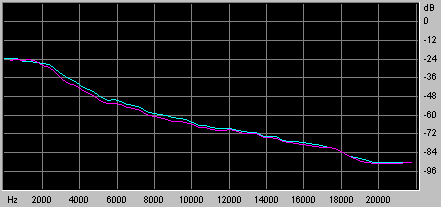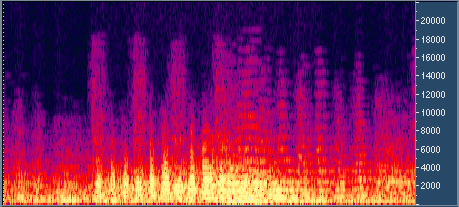
128kb/s ASF Frequency Response

128kb/s ASF Spectral View
Here we have the results of testing the Microsoft
Audio Codec version 1 at 128kb/s. As WinAmp now has Windows Media
support it was used to capture the output to a wave file.
You can see that the frequency response is faithfully
reproduced up to nearly 16kHz but is slightly suppressed above this.
The spectral graph also shows plenty of content right
up to 22kHz. You can see how some lower intensity content has been
pruned down to about 12kHz. There are some other noteworthy observations
that can be made about the spectral graph as well.
The spectral graph of the source material shows LESS
high frequency content above 20kHz than the ASF file. This would
indicate to me there are a lot of distortion components in the ASF
output signal.
Comparing the bright vertical bars in the spectral
view where the trumpet notes are playing to the source material
graph is very revealing. You will see that the bars in the ASF file
are much broader than in the reference material's plot. There is
quite a lot of pre and post transient material being added.
Listening tests also reveal the shortcomings of encoding
with this codec. The sound is slightly fuzzy and transients lack
definition. The valve noises from the trumpet are heard as clicks
and don't sound like the original at all. Stereo imaging is also
not well defined.
There is no doubt that a 128kb/s MP3 file sounds better
than the ASF file. At very low bitrates though the Microsoft codec
performs a lot better on sound quality than MP3.
The one impressive feature of this codec is its encoding
speed. My machine could quite easily encode the file at faster than
real time at 128kb/s. This means that the format would be a good
choice for streaming high quality live content. We are likely to
see some refinement in the encoder as it is still a very new format.
The CPU overhead of about 23% for playback on my machine
is almost identical to MP3 at this rate.
[Back] [Next]